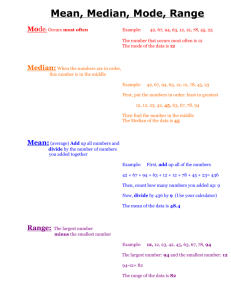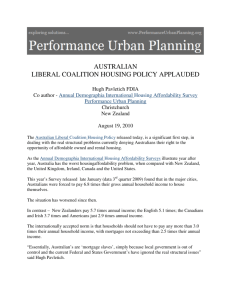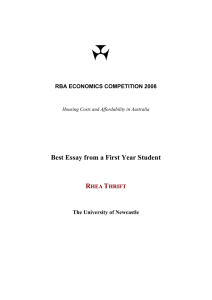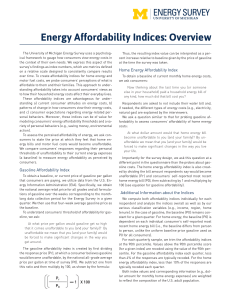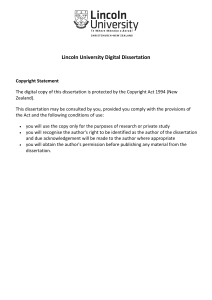Wendell Cox on Housing Affordability
advertisement
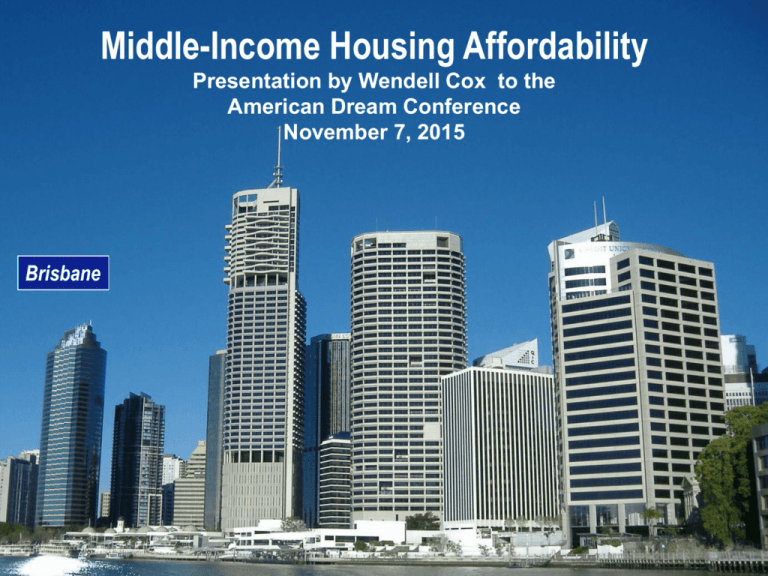
Middle-Income Housing Affordability Presentation by Wendell Cox to the American Dream Conference November 7, 2015 Brisbane MIDDLE INCOME HOUSING AFFORDABILITY G-20 Priorities: Better Standard of Living Alleviating Poverty Requires Middle-Income Housing Affordability Discretionary Income DEFINES THE STANDARD OF LIVING & POVERTY Discretionary Income (=) Gross Income Minus Taxes and Necessities (Such as Housing, Transportation & Clothing) Democratization of Prosperity ASSOCIATED WITH HOME OWNERSHIP From Levittown NY to Lakewood Lakewood, California Measuring Housing Affordability THE DEMOGRAPHIA SURVEY MEDIAN MULTIPLE Median house price divided by Median household income Table 1 Housing Affordability Rating Categories Rating Severely Unaffordable Seriously Unaffordable Moderately Unaffordable Affordable Median Multiple 5.1 & Over 4.1 to 5.0 3.1 to 4.0 3.0 & Under 9 Nations 86 Major Markets 378 Total Markets Urban Growth Boundary & Land Values THE THEORY Land Value AFTER URBAN GROWTH BOUNDARY BEFORE URBAN GROWTH BOUNDARY LOCATION OF URBAN GROWTH BOUNDARY (Land Value Gap) Leading theorists: Lower costs of higher density housing would negate land price increases Distance from City Centre Figure 6 Impact of Urban Growth Boundary PORTLAND RAW LAND VALUES: ADJACENT TO UGB House Price to Income Ratio INTERNATIONAL:1980s-2000s 3.0 Maximum Affordability Standard All major markets were below or near 3.0 before urban containment. Source: Federal Reserve Bank of Australia Land Rationing is the Issue DESTROYS HOUSING AFFORDABILITY ... the affordability of housing is overwhelmingly a function of just one thing, the extent to which governments place artificial restrictions on the supply of residential land. Donald Brash, Governor, Reserve Bank of New Zealand 1988-2002 Introduction to 4th Annual Demographia International Housing Affordability Survey Recognition of the Problem GOVERNMENT OF NEW ZEALAND Land has been made artificially scarce by regulation that locks up land for development. This regulation has made land supply unresponsive to demand. Bill English, Deputy Prime Minister New Zealand Introduction to 9th Annual Demographia International Housing Affordability Survey Paul Cheshire ECONOMIST Urban containment is Irreconcilable with Housing affordability All Lost Equality in Housing? THE “DISAPPEARING” MIDDLE CLASS Virtually all increased inequality is in higher housing values Much due to Housing regulation -Rognlie, MIT Excessive Land Regulation: Lost GDP EUROPEAN & US RESEARCH London Higher commercial Development costs -Cheshire & Hilbur London School of Economics 20% less job growth than expected in metropolitan areas with strongest land use regulation -Raven Saks US Federal Reserve Board Reduced employment in Amsterdam/Rotterdam $2T GDP Loss: US -Vermuelen & Ommeren Netherlands Bureau of Econ. Rsch. -Hsieh & Moretti UIC & UCB Middle-Income Housing Affordability MAJOR US METROPOLITAN AREAS: 1950 – 2014 10 Less Restrictive Markets More Restrictive Markets: Outside California California (All More Restricted Markets) 9 8 Median Multiple 7 6 Annual Data Begins at 1980 5 4 3 2 1 Median Multiple: Median House Price divided by Median Household Income 0 1950 1960 1970 1980 1985 1990 1995 2000 2005 2010 Derived from Census Bureau, Harvard University and Demographia. Housing Adjusted Poverty Rates: 2013 UNITED STATES, CALIFORNIA & MISSISSIPPI 25% Mississippi has historically had the worst poverty 20% 15% 23.4% 10% 15.3% 5% 0% California Legislative Analysts Report California Source: US Census Bureau Mississippi CALIFORNIA: NEED TO LIBERALIZE REGULATIONS Far from helping, they are making it particularly difficult for Latino and African American households to own a home "Suburbs rarely cease growing of their own accord. The only reliable way to stop them … is to stop them forcefully. But the consequences of doing that are severe." welcome foreigners Progress: New Zealand & Florida REFORM COMES FROM THE OUTSIDE, NOT PLANNING • New Zealand – Legislation – Productivity Commission • Auckland – Affordability target • Florida – Repealed Smart Growth Auckland NEW ZEALAND PRODUCTIVITY COMMISSION Proposal Housing affordability greenfield land release Outcomes…. •decline in home ownership rates; •increasing shares of their income to housing, with associated impacts on wellbeing; •a more uneven distribution of national wealth; •ongoing overcrowding, with associated health and social costs; •a greater risk of economic volatility and macroeconomic instability; •barriers to labour market mobility; •an undermining of the effectiveness of monetary policy to manage economywide inflation •pressure on fiscal policy, through direct and indirect paths.54 For example, through social housing. Non-Ideological Approach The Commission does not have a preference for whether cities grow out or up. Our larger cities will always have an element of both. In any event, what matters ultimately are the preferences of households and whether they have available to them choice of housing types at different price points to cater for a range of income levels. Councils in our largest cities should be able to pursue the goal of a compact urban form if that is what their communities want. The key test is whether they deliver sufficient development capacity to house a growing population while delivering a choice of quality, affordable dwellings of the type demanded by purchasers. Where large discontinuities emerge between the price of land that can be developed for housing and land that cannot be developed, this is indicative of the inadequacy of development capacity being supplied within the city Impact of Urban Growth Boundary PORTLAND RAW LAND VALUES: ADJACENT TO UGB Productivity Commission Recommendations – Right to plan – Obligation – Plans not reflecting preferences – Differential at UGB – Creates national externalities – Event based trigger: Release greenfield land "That's denying a whole generation of New Zealanders affordable housing options in areas where they want to live. We are going to say from central Government's view that affordable housing is a matter of national importance and we are going to require councils, like Auckland Council, to restrict the use of density and height controls so they can't be used to prevent affordable housing being built." "It will be a reduction in the veto power of existing residents. At the moment ... they put a premium on the right of neighbours to object in a community. What we are saying is we have to take into account the whole of New Zealand and future generations who desperately need affordable housing."

